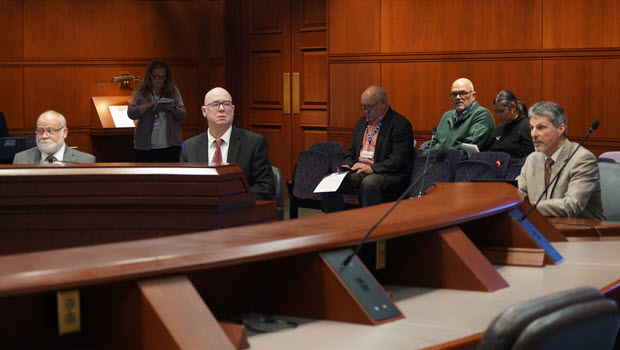In this politically charged atmosphere teachers on both sides of the aisle may wish to exercise their First Amendment rights and comment publicly on matters of public concern, but the lack of just cause and binding arbitration in state teacher termination statutes means that teachers can put their jobs at risk when they speak out.
In her testimony in support of Senate Bill 1371 before the legislature’s Labor and Public Employees Committee today, CEA President Kate Dias illustrated the problem with current statue by giving the example of a hypothetical teacher who may feel strongly in favor of or against dismantling the U.S. Department of Education. When that teacher makes a comment about their opinion on a town Facebook page that draws the attention of community members who contact the board of education or administration, that teacher can suddenly find that their job is at risk.
“We are finding that if you express a political opinion that makes people uncomfortable or becomes a topic of conversation in the community and your superintendent or board of education would prefer you not have that opinion, they can utilize the current language of the termination statute to say, ‘You’re creating a disruption to the educational process. We have due and sufficient cause, and we can remove you from your teaching position,'” Dias said.
SB 1371 An Act Establishing a Just Cause Standard for Teacher Contract Terminations and Making the Decision of a Neutral Hearing Officer in Teacher Contract Termination Hearings Binding on the Parties would give teachers the same due process rights afforded other municipal employees.
[Pictured above, CEA UniServ Reps Brett Pickerign, Michael Casey, and Ed Thibodeau shared with legislators how the lack of just cause protection harms teachers.]
“Unlike other board of education employees, the termination process for certified educators is governed by state law (CGS 10-151), and not by collective bargaining,” Dias said. “As a result, for other board of education employees, discipline is meted out according to a recognized legal standard of just cause. This standard ensures that the process is fair, any resulting discipline is proportionate, and that appropriate consideration is given to any past incidents.”
“In my 10 years of experience with teacher matters I’ve seen almost no teachers suspended without pay but have seen many teachers forced to resign,” CEA UniServ Rep Ed Thibodeau told legislators. “This is because the just cause standard and neutral arbitrator apply to all lower levels of discipline but not to terminations, which are governed by 10-151d. It literally is easier to fire a teacher than to suspend one. This creates a perverse situation in which a teacher is fired for the same infraction that might result in a short suspension for a secretary or paraprofessional.”
“In my 12 years at CEA, I have never had a teacher go to a board hearing to contest a recommendation to terminate,” said UniServ Rep Brett Pickerign. “Instead, in nearly every instance, the teacher resigns with a separation agreement. This is not because of overwhelming evidence against the teacher. On the contrary, in several instances the teacher had strong arguments against termination. However, the prospect of enduring a difficult hearing before a neutral hearing officer only to achieve a victory that can be quickly reversed by the board after minimal review is a strong incentive to just go quietly.”
In 2018, the Avon Education Association was able to negotiate a just cause standard for disciplinary action into their contract. Avon local president Jon Moss told legislators that in the years since he and his superintendent have never had a conflict over the provision because it works for both employees and the employer.
“We have a shared belief in treating employees fairly, and we know when teachers are supported, they’re best able to support their students,” Moss said.
“The just cause standard means that teachers will only be punished or let go for valid reasons. It creates a more just and balanced process,” said Stonington teacher Carrie Cassady. “When teachers feel safe and secure in their jobs, they’re more likely to stay and keep teaching. Without just cause, teachers might be afraid to speak up about problems like unsafe conditions or other issues that could affect students. ”
CEA leaders and staff also asked legislators to rethink some of the language in SB 1371 to ensure that the just cause standard applies to all reasons for termination covered by 10-151
“It’s very important that one standard be consistently used throughout the statute, and that all teachers have the same right to a fair and impartial hearing, regardless of the stated reason for the termination,” Thibodeau said.
“Principles of just cause, as determined by a neutral third-party with binding authority have existed for decades because the decision of whether to take a person’s livelihood away should be based on reasonableness and fairness, not personal likes or dislikes, or shifting political winds,” CEA UniServ Rep Michael Casey said. “We have lost too many talented people from the teaching profession. I respectfully urge you to move this bill forward.”







